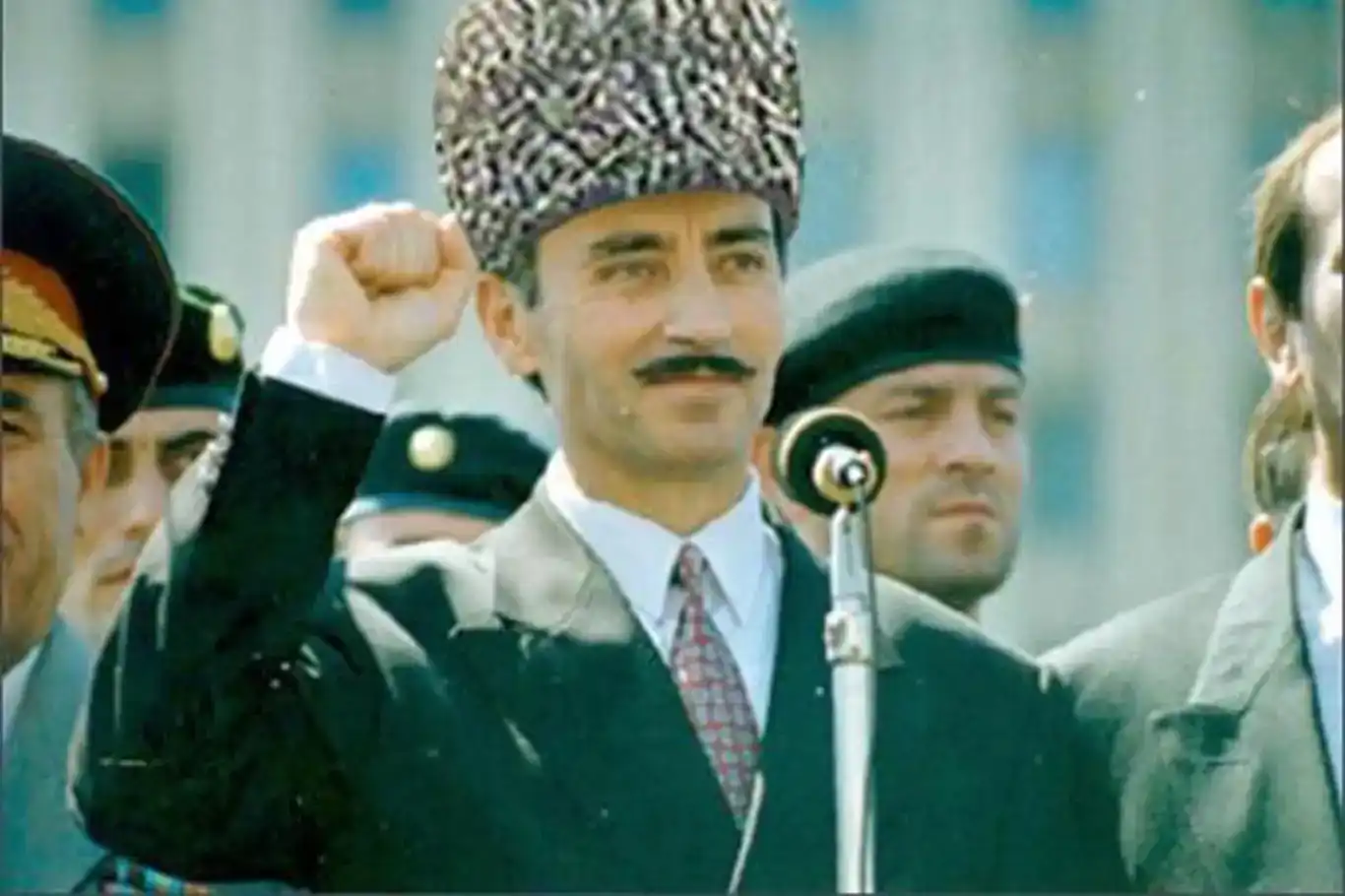Chechens commemorate 29th anniversary of Dzhokhar Dudayev’s martyrdom


Today marks the 29th anniversary of the martyrdom of Dzhokhar Dudayev, the founding leader of the independent Chechen Republic of Ichkeria and an enduring icon of resistance against Russian imperialism.
On April 21, 1996, Dudayev was martyred by a Russian air-to-ground missile strike while reportedly speaking to a Russian intermediary by satellite phone, discussing prospects for peace. His targeted killing sent shockwaves through Chechnya and confirmed the high price of defying Russian rule.
A Life of Struggle, A Legacy of Resistance
Dzhokhar Dudayev was born in 1944 into the horrors of Soviet repression. Just days after his birth, Stalin ordered the mass deportation of the entire Chechen and Ingush populations to Central Asia. Dudayev’s family was among those exiled to Kazakhstan, where he spent his early childhood in forced displacement.
After returning to Chechnya in 1957 following Khrushchev’s partial rehabilitation of deported peoples, Dudayev pursued education and military service. He went on to become a general in the Soviet Air Force — the first and only Chechen to do so — commanding a strategic bomber division in Estonia.
However, his loyalty was to his people, not to the Soviet regime. With the collapse of the USSR in the early 1990s, Dudayev returned to Chechnya and became the leading figure of the independence movement. In a landmark moment in 1991, the Chechen people overwhelmingly elected him president of the self-declared Chechen Republic of Ichkeria.
On November 1, 1991, he proclaimed Chechnya’s independence, directly challenging Moscow’s authority. His declaration was met with outrage by the Kremlin, which refused to recognize Ichkeria’s sovereignty — setting the stage for a brutal war.
The First Chechen War and Global Reverberations
The First Chechen War (1994–1996) saw Dudayev lead a vastly outgunned and isolated republic against the Russian Federation’s full military might. Despite facing aerial bombardments, tank invasions, and artillery sieges, Chechen fighters mounted a fierce and disciplined guerrilla defense.
Dudayev’s leadership — deeply charismatic, nationalistic, and rooted in Islamic identity — inspired a generation of Chechens. Under his command, the capital Grozny witnessed one of the most humiliating defeats of the Russian army in post-Soviet history. The resistance shattered Russia’s image of invincibility and brought the Chechen cause to international headlines.
While the war’s devastation was immense and human losses staggering, Dudayev’s resolve never wavered. He repeatedly called for negotiations while insisting on full independence, resisting any proposal that would compromise Chechnya’s sovereignty.
A Martyr Remembered
Dzhokhar Dudayev’s assassination in 1996, orchestrated through intelligence tracking of his satellite phone signal, silenced a leader but gave rise to a legend. His name became synonymous with the Chechen cause. His martyrdom galvanized supporters, further deepening the struggle for self-rule and inspiring resistance movements across the Caucasus and beyond.
Today, Dudayev is remembered not just as a political leader, but as a visionary — a man who saw a free Chechnya governed by its own people, rooted in Islamic values and national dignity.
From Grozny to Istanbul, from Vienna to Amman, Chechens are holding Quran recitations, poetry readings, historical exhibitions, and panel discussions in his honor. Memorial prayers were held in mosques across the North Caucasus. In Istanbul, where a significant Chechen exile community resides, community leaders called for renewed unity and continued non-recognition of Russian occupation.
"His Spirit Lives On"
Chechen activists emphasize that Dudayev’s legacy remains a source of hope and determination.
“President Dudayev did not die in vain. His blood is a seed in the soil of our struggle,” said a Chechen activist in exile. “He taught us to never kneel before tyranny, to cling to justice, and to defend our homeland at all costs.”
Young Chechens born after his death continue to learn about his life through oral histories, archived footage, and cultural narratives passed down by elders. In an age of growing authoritarianism and silencing of dissent, Dudayev's life remains a defiant example of leadership rooted in courage, sacrifice, and belief in divine justice.
A Legacy Challenging Occupation
Though Moscow has since installed a loyalist regime in Chechnya and waged a long campaign of cultural erasure, calls for Ichkerian independence continue to echo. The Chechen Republic of Ichkeria remains recognized by several governments and movements-in-exile. Its flag still flies at opposition rallies across Europe, and Dudayev’s image appears on posters, walls, and social media timelines.
In today’s commemorations, Dudayev’s words are once again being quoted: “Freedom is not given — it is taken. And if necessary, it is taken back by blood.”
His supporters maintain that Chechnya’s future remains unwritten — and as long as Dudayev is remembered, so too is the dream of a sovereign Ichkeria. (ILKHA)
LEGAL WARNING: All rights of the published news, photos and videos are reserved by İlke Haber Ajansı Basın Yayın San. Trade A.Ş. Under no circumstances can all or part of the news, photos and videos be used without a written contract or subscription.
The European Union is grappling with an unprecedented escalation in drug trafficking, with officials estimating that over 100 tons of cocaine enter the continent each year—a figure that European security agencies admit may represent only a fraction of the true scale.
On November 2, 1917, British Foreign Secretary Arthur James Balfour sent a short letter to Zionist leader Lord Rothschild, pledging Britain’s support for a Jewish homeland in Palestine.
One year has passed since Yahya Sinwar, the legendary leader of Hamas in the Gaza Strip, was martyred in a direct confrontation with Israeli forces in Rafah.
Two years have passed since the morning that forever altered the course of the Palestinian struggle — the dawn of October 7, 2023, when the besieged enclave of Gaza broke through its prison walls in a thunderous uprising now etched into history as Operation Al-Aqsa Flood.